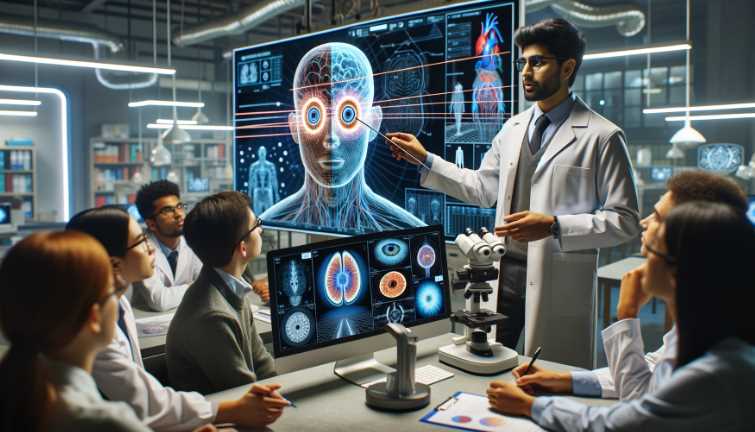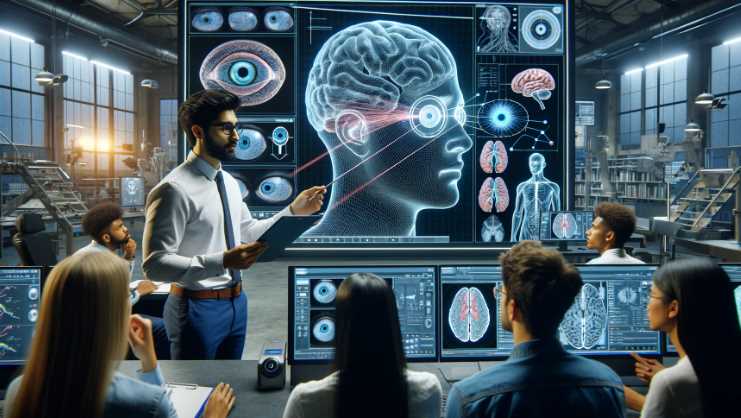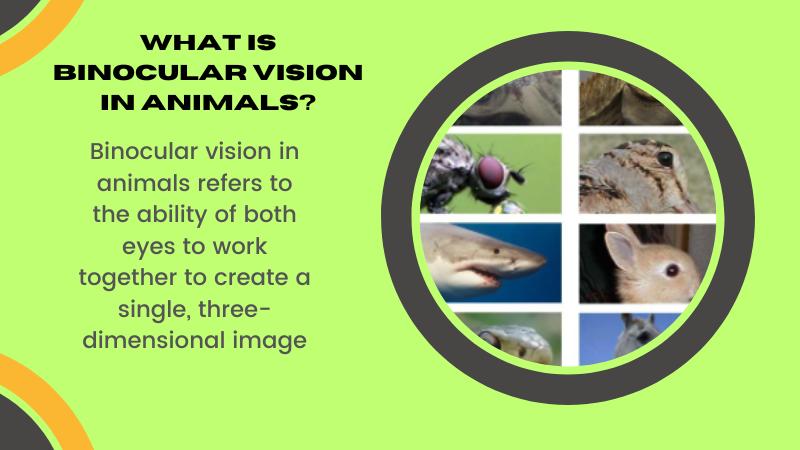Yes, binocular vision contributes significantly to depth perception.
Binocular vision refers to the ability of an organism to use both eyes simultaneously to perceive three-dimensional (3D) depth and distance. The key factor enabling depth perception in binocular vision is the slight difference in the images captured by each eye, known as binocular disparity.
When an object is closer to an observer, the retinal disparity (the difference in the images formed on each retina) is more significant, allowing the brain to compute depth based on this information. This process is called stereopsis, and it enhances the perception of depth in the visual field.

| Aspect | Description |
|---|---|
| Definition | Use of both eyes simultaneously to create a 3D visual perception. |
| Key Mechanism | Binocular disparity – the slight difference in images captured by each eye. |
| Depth Perception | Significant contribution to perceiving depth and distance. |
| Stereopsis | The brain’s ability to interpret retinal disparity for enhanced depth perception. |
| Advantages | Improved accuracy in judging distances, better navigation, and enhanced object recognition. |
| Common Examples | Viewing 3D movies, judging distances while driving, catching a ball, and other spatial tasks. |
How does binocular vision contribute to depth perception?
Binocular vision plays a crucial role in depth perception, allowing us to perceive the world in three dimensions. This ability is achieved through the coordination of both eyes, providing the brain with slightly different images that are then fused together to create a sense of depth.
Table: Factors Influencing Depth Perception
| Factor | Description |
|---|---|
| Binocular Disparity | The slight difference in the images seen by each eye, which the brain uses to calculate depth. |
| Convergence | The degree to which the eyes turn inward when focusing on a close object, providing depth information. |
| Stereopsis | The brain’s ability to interpret the binocular disparity, resulting in the perception of depth. |
Can individuals with one eye still have depth perception?
Yes, individuals with only one eye can still perceive depth, but their depth cues are primarily monocular. Monocular cues include relative size, overlap, and perspective, allowing individuals with one eye to estimate distances based on these visual cues.
Table: Monocular Depth Cues
| Cue | Description |
|---|---|
| Relative Size | Objects farther away appear smaller than closer objects. |
| Overlap | When one object partially obstructs another, the obstructed is closer. |
| Perspective | Parallel lines converge in the distance, indicating depth. |
Are both eyes equally important for depth perception?
Yes, both eyes are equally important for binocular depth perception. The brain integrates the information from each eye to create a unified and three-dimensional perception of the environment. When one eye is compromised, such as through injury or vision impairment, it can affect the accuracy of depth perception.
Table: Importance of Each Eye
| Aspect | Description |
|---|---|
| Binocular Disparity | Requires input from both eyes to calculate the differences in images. |
| Stereopsis | The brain’s ability to interpret binocular disparities is dependent on both eyes. |
How does age affect binocular vision and depth perception?
As individuals age, changes in vision can impact binocular vision and depth perception. Presbyopia, the gradual loss of the eyes’ ability to focus on close objects, can affect the convergence ability, leading to challenges in perceiving depth for nearby objects.
Table: Age-Related Changes
| Age Group | Changes |
|---|---|
| Young Adults | Typically have optimal binocular vision and depth perception. |
| Older Adults | May experience challenges due to presbyopia and changes in eye health. |
Can binocular vision be improved through exercises?
Certain eye exercises and vision therapy can enhance binocular vision and improve depth perception. These exercises often focus on strengthening eye muscles, improving convergence, and promoting better coordination between the eyes.
Table: Binocular Vision Exercises
| Exercise | Purpose |
|---|---|
| Convergence exercises | Strengthening the ability of the eyes to turn inward for close focus. |
| Stereogram viewing | Training the brain to interpret binocular disparities more effectively. |
Is depth perception affected by eye misalignment?
Yes, eye misalignment, also known as strabismus, can impact depth perception. When the eyes are not properly aligned, the brain may struggle to fuse the images from both eyes correctly, leading to difficulties in perceiving depth accurately.
Table: Strabismus and Depth Perception
| Condition | Impact on Depth Perception |
|---|---|
| Strabismus | Misalignment may result in conflicting visual information, affecting depth perception. |
| Amblyopia (Lazy Eye) | A common consequence of strabismus that may further impact depth perception. |
Can corrective lenses enhance binocular vision?
Corrective lenses, such as glasses or contact lenses, can improve binocular vision by correcting refractive errors in each eye. Clear vision in both eyes ensures that the brain receives accurate visual input, enhancing the ability to perceive depth.
Table: Corrective Lenses and Binocular Vision
| Type of Lens | Impact on Binocular Vision |
|---|---|
| Glasses | Corrects refractive errors, providing clear vision for both eyes. |
| Contact Lenses | Offers an alternative to glasses, correcting vision for both eyes. |
How do virtual reality (VR) and 3D technology utilize binocular vision?
Virtual reality (VR) and 3D technology leverage binocular vision to create immersive and realistic experiences. By presenting slightly different images to each eye, these technologies simulate depth perception, making users feel as if they are part of a three-dimensional environment.
Table: VR and 3D Technology
| Technology | Utilization of Binocular Vision |
|---|---|
| Virtual Reality (VR) | Creates a three-dimensional, immersive environment for users. |
| 3D Movies and Games | Presents separate images to each eye, mimicking natural vision. |
Can certain medical conditions affect binocular vision and depth perception?
Several medical conditions can impact binocular vision and depth perception. Conditions such as cataracts, glaucoma, and macular degeneration may affect visual acuity and the ability of the eyes to work together cohesively.
Table: Medical Conditions and Vision
| Condition | Impact on Binocular Vision and Depth Perception |
|---|---|
| Cataracts | Clouding of the eye’s lens may cause blurred vision and affect depth perception. |
| Glaucoma | Increased intraocular pressure can damage the optic nerve, impacting vision. |
| Macular Degeneration | Degeneration of the macula can result in central vision loss, affecting depth perception. |

Fahim Foysal is a well-known expert in the field of binoculars, with a passion for exploring the great outdoors and observing nature up close. With years of experience in the field, Fahim has honed his skills as a binocular user and has become a go-to resource for those seeking advice on choosing the right binoculars for their needs.
Fahim’s love for the natural world began during his time at The Millennium Stars School and College and BIAM Laboratory School, where he spent much of his free time exploring the outdoors and observing the wildlife around him. This passion for nature led him to pursue a degree in Fine Arts from the University of Dhaka, where he gained a deep understanding of the importance of observation and attention to detail.
Throughout his career, Fahim has used his expertise in binoculars to help others discover the beauty of the natural world. His extensive knowledge of binocular technology and optics has made him a trusted advisor for amateur and professional wildlife observers alike. Whether you’re looking to spot rare birds or observe animals in their natural habitats, Fahim can help you choose the perfect binoculars for your needs. With his guidance, you’ll be able to explore the outdoors with a newfound appreciation for the beauty of the natural world.
Table of Contents


Pingback: Binocular Vision in Animals: A Marine Biologist's Perspective